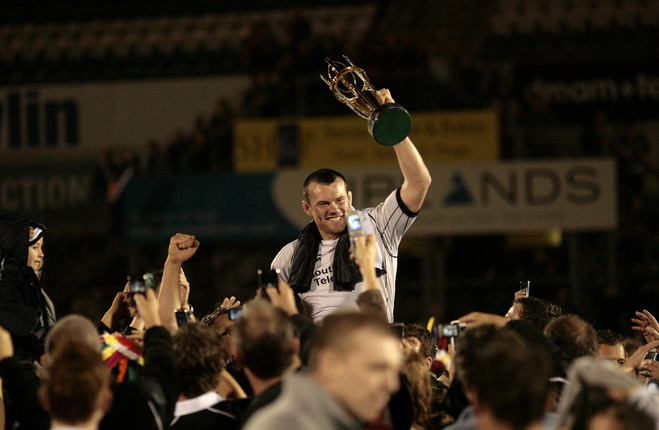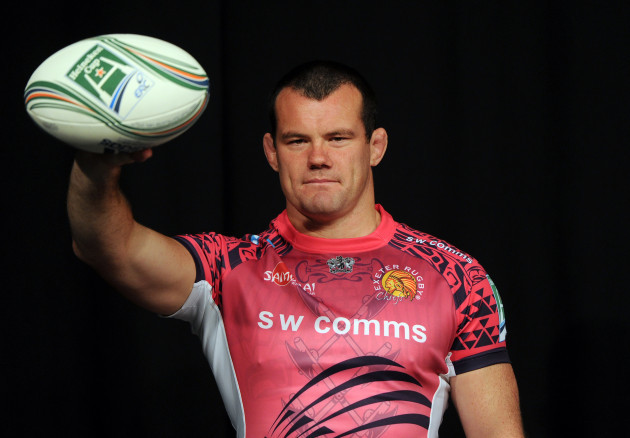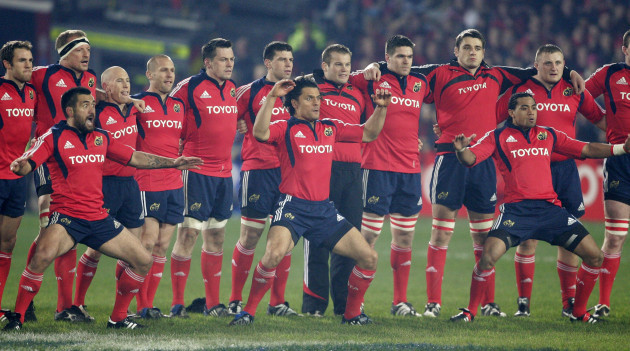MORRISSEY, LEAD SINGER of The Smiths; world-class songwriter; world class crank; probably isn’t the first person that comes to mind when you think about Munster’s Champions Cup date with Exeter.
Still, there’s this song of his, Irish blood, English heart, that might as well have been written about big Tom Hayes. In rugby terms, Hayes can’t go many places in Ireland without references to the fact he is The Bull’s younger brother, even if he has an identity of his own: a husband, a father, a coach. In Exeter, it’s different. There, it is The Bull who is known as Tom’s sibling.
There’s a Rocky Balboa element to how this all panned out, how a kid with a pair of boots in his hands and dream in his head, eventually ended up in the city via a stint with Plymouth. He’d left Ireland on a hunch. The Celtic Tiger was in full voice but Hayes’ rugby career was in danger of slipping into a sporting recession. A lock-cum-No8, he glanced around the Munster dressing room and saw Paul O’Connell and Donncha O’Callaghan on one side of the room and Anthony Foley on the other.
“I just didn’t feel like closing the book on rugby,” he says. “I wanted to give it a go full-time.”
As it happened, the dressing room at Plymouth Albion in the English championship had a couple of empty seats. They were going well at the time but Hayes ‘without wanting to sound cocky or anything’ didn’t fancy the idea of relocating to Devon to solely pick up a few quid in the English second-tier.
“When I arrived in Plymouth in 2005, I didn’t know a soul in the city.” Worse than that, he didn’t even know the name of the club. But his brothers had journeyed further, to New Zealand, to learn their rugby so England’s south-west wasn’t exactly the far end of the world. It was a one-year deal, a stepping stone.
“I had a bit of ambition,” he said.
It just so happened he’d fulfil it up the road. A natural leader, he wasn’t shy about calling line-outs or calling out team-mates who weren’t putting everything in. Plymouth got the best out of him but couldn’t get out of the division. And that was when this emerging coach called Rob Baxter gave Hayes a call.
Way back then Baxter was a nobody on a national scale but a big fish in Devon rugby’s small pond. Anyway, Hayes liked the cut of his gib and before you know it, he was signing there, quickly appointed their captain, the one who led them to promotion after a decade of falling short.
Think of Exeter now and you think of a European heavyweight. Think of them then and they were anything but. “Still, there were similarities with the Munster story of the Noughties,” says Hayes. “Even in terms of the pace of life; it is not as hectic as it would be in the big capital city, not dissimilar to where I grew up (outside Limerick city).
“Then (from a rugby perspective) there were the near misses. For years, the European Cup was Munster’s goal; for us, it was getting to the Premiership. When I signed there, and listened to Rob’s vision for the place, well, it wasn’t a million miles from the ambition I had for myself. It was a good fit for me.”
And he was for them.
When Hayes landed in Exeter in 2008, it was because Baxter realised the club needed a jolt of energy. They’d become specialists in missing out on promotion and while their move to a nice, shiny new ground on the outside of the city suggested big things lay ahead, Baxter knew something was missing.
In Hayes, he saw just what he needed; pulling the Limerick-man to one side the day after Munster had nearly beaten the All Blacks in 2008, asking how they were able to make such a strong connection with the community around them. “That’s the level of engagement between players and supporters we want here,” Baxter said.
They got it. Smart signings, a formidable team spirit, a world class coach, it all led to promotion in 2010, Hayes as captain. “The reason people bought into us was because of the character traits we had,” says Hayes. “You can admire a team when it is filled with triers.”
In a sense, the bond is always easier for the supporter. All they really want is to see the players who wear the shirt show pride in it. What’s more interesting is how a player, previously a stranger to the city, can end up feeling a deeper attachment to the club he played in than the one he grew up supporting.
“I happened to be there at a big time in my life and also a big time in the club’s life. I got married during my time there; two of my kids were born in Exeter. Personally, a lot of big, big things happened for me in my life.
“While all this was going on, the club was taking big steps. When I joined, I knew they were going places. A lot of those guys – Tony Lowe (the chairman), Rob (Baxter, the director of rugby) – are still there. I was there last weekend for the 150th celebration of the club. It is a home from home for me, a place where I feel, ‘I can fit in here’.”
He fitted in long enough to clock up 135 games in the Premiership, his career cut short at 33 with a back injury. “Look, I don’t want no sob story; I got so much out of rugby and out of Exeter. I went across to England initially for a year; I stayed there for nine. I played the best rugby of my life there. I went across with the specific intention of climbing the ladder and got to do that.”
So, there aren’t many regrets. Just one, really. By the time he was finishing up, Exeter were doing a lot more than merely staying up. “Internally, we knew we were going places,” Hayes said. “No one around England might have realised that. But the finals, the trophies, the play-offs, we knew that was about to happen.”
It all happened without him but he stayed in touch, Baxter respecting him so much that last summer he came back to him and offered him a job on their coaching staff. It would be no surprise if they came back for him again. “It is not necessarily a chapter closed.”
Before all that, there’s a certain game to discuss. Munster, the province he was born in, the one he watched his brother embark an odyssey in, face his old club. “I have more personal connections with people in the Exeter squad than I have in the Munster one,” Hayes says, “in terms of being able to pick up a phone or meet someone for a pint.
“That probably puts me in the Exeter camp.”
In a sense that sounds a bit weird but really it shouldn’t. One club allowed him fulfil a dream, the other crushed it. Whoever loses this tie will hurt for him. Whoever wins will get his undivided attention. “Exeter need a lead to defend coming to Thomond Park,” he says. “That’s one place you don’t want to come from behind in, to win. But Munster will miss Gavin Coombes. He’s a big player for them, someone who just gets out there and makes things happen for himself and the team.”
That story sounds familiar.



